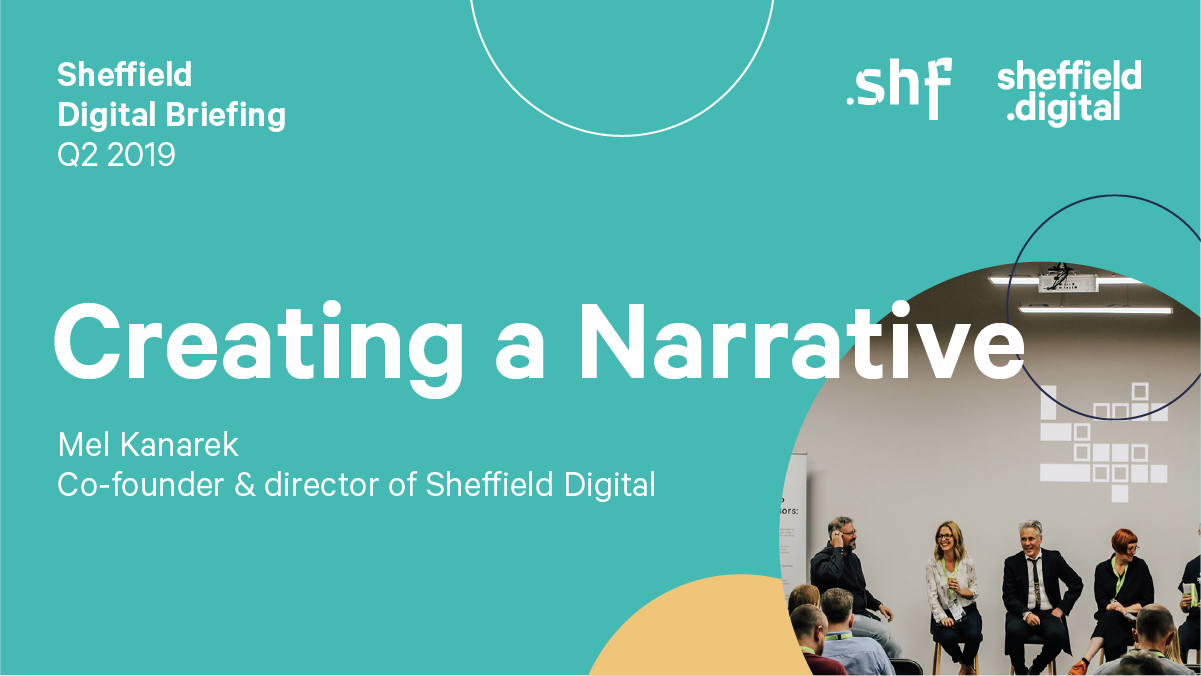
In this opening editorial article, Mel sets the stage for the quarterly briefing, recaps the recent history of Sheffield’s tech cluster, and our hopes and intentions for the future.
It gives me a great deal of personal satisfaction to write this introduction to the first Quarterly Briefing on Sheffield’s digital economy. For those of us who spend our working days immersed in the sector, it is easy to assume that everyone knows about the wealth of local talent that is driving innovation, job creation and financial growth into the regional economy. But from an outside perspective, it can be hard to grasp a sector that is largely intangible.
This publication is an effort to bring the sector into focus by creating a quarterly snapshot that combines facts and figures with a more qualitative perspective in order to create a narrative that can be understood and shared. I’d like to begin with a little bit of fairly recent history. When myself and the four other co-founders of Sheffield Digital decided about four years ago to create an organisation to act as a virtual hub for the digital industries, we were acting on something close to a hunch. From the day to day contact that we all had with people and businesses working in and with technology, we were convinced that there was enormous potential in the sector. Our hope was that, by helping the local industry to come together to share information, form collaborations and communicate more consistently, we could support the realisation of that potential and help put Sheffield on the national (and international) map as the home of a significant digital technology cluster.
Since then there have been a number of milestones that have shown that our hunch was a good one:
- 2015, 2016, 2017, 2018 & 2019
Sheffield highlighted as a tech cluster in the Tech Nation report. - 2016
Incorporation of Sheffield Digital as a Company Limited by Guarantee.
First Front End North conference. - 2017
The University of Sheffield’s Creative Digital Snapshot Report.
Launch of Sheffield Hallam University’s Digital Degree Apprenticeships.
Creation of the Sheffield Digital Coalition (dotSHF).
Two Sheffield start-ups are winners in the Tech North Northern Stars competition. - 2018
Development of the Sheffield free city centre WiFi network.
First LegalTech North conference.
Sheffield Digital joins the UK Tech Clusters Group.
First loT Tribe North accelerator in Barnsley.
National Videogame Museum moves from Nottingham to Sheffield. - 2019
Opening of Kollider tech hub, incubator and event space.
Sheffield Digital Awards and the inaugural Sheffield Digital Festival.

These are only a few highlights that demonstrate a growing momentum in the city region. However, what they don’t do is provide much detail on what is happening inside the city’s digital businesses. Anecdotally, we know that businesses are growing: the number of jobs being posted on the Sheffield Digital jobs board has increased steadily over the past three years; most of the city’s flexible workspaces are full or close to capacity, several new co-working spaces have opened and the demand for quality office space is increasing; local digital companies regularly win awards and a number of them have recently completed acquisitions or new funding rounds; to say nothing of the increasing number of external firms who have decided to relocate or set up satellite development teams in our city.
However, the statistics available to us from generally available sources do not seem to fully capture this picture. By creating this quarterly briefing, we hope to both provide more granular and up-to-date detail and help shape a narrative that will illuminate what makes Sheffield’s digital cluster significant. A first step towards this is the idea of four “pillars” of Sheffield’s tech scene, which you can find in this blog post. This is a work in progress and is being developed in collaboration with national and regional policy makers – your feedback is encouraged. At the time of writing, we are also waiting to find out what data will be made available from the 2019 Tech Nation report, which had a more national focus than previous reports and so did not publish the comparative data between clusters that we have had before. Thus, there is a definite need for a consistent set of data points that we can use to track the development and performance of the sector and put that within the context of the wider regional economy. That ambition will form part of the development of this quarterly publication.
Mel Kanarek
Co-founder and Director
Sheffield Digital
This article was published in the 2019 Q2 Quarterly Briefing. For the rest of this publication, and others in the series please visit the Sheffield Digital Ecosystem Update page.